Utilized the materials in "International Cooperation Activity Exhibition" planned by Chiyoda City
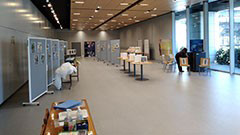
The exhibition was held in Chiyoda City Hall.
Since March 15th till 19th, 2021, Chiyoda City had held "International Cooperation Activity Exhibition" in Chiyoda City Hall located within Chiyoda City office. This exhibition showed the current condition and problems of developing countries on the themes of healthcare, medical care, and sanitation, and introduced JICA's activities to solve problems of developing countries under the situation of COVID19. In the exhibition, we utilized JICA-Net multimedia-based learning materials; "Maternal and Child Health Handbook to the World- The Process of Introduction and Dissemination in Developing Countries -", "JICA's Cooperation on water and sanitation", and "JICAs Cooperation in the Health Sector -Actions for Human Security in Health-".
JICA's activities in various sector
"Maternal and Child Health Handbook to the World - The Process of Introduction and Dissemination in Developing Countries -" (external link) , one of the materials we used this time, introduces JICA's project that aims to spread Maternal and Child Health Handbook (MCH Handbook) that have various advantages. MCH Handbook, which is called "The passport for life" in Palestine, especially contributes to the improvement of maternal and child health in developing countries where people do not receive health services enough. Instead of introducing Japanese MCH Handbook directly, JICA analyzed situations of targeted countries and regions in advance, and modified MCH Handbook flexibly for various situations and adjusted it to each system. It is a distinctive feature of JICA's international cooperation.
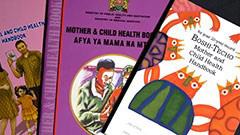
MCH Handbook is an innovative tool that integrates both maternal and child records into one handbook.
"JICA's Cooperation on water and sanitation" (external link) shows JICA's approach for cooperation in the water and sanitation section through representative examples of Cambodia, Senegal, and Vietnam. Water and sanitation, which are indispensable for our lives, are a life and death issue for millions and demanding urgent measures to improve this situation. JICA is working to supply clean and safety water to more and more people.
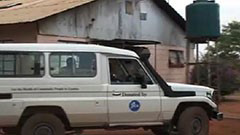
A mobile clinic service. Hospitals dispatch medical staffs to village health centers
"JICA's Cooperation in the Health Sector - Actions for Human Security in Health -" (external link) is the material that shows JICA's various efforts in the health sector through examples of health system strengthening, maternal and child health, and infectious disease control. "Human Security" is the basic policy of Japan development systems. Security of people's lives and health are the important matter in JICA's cooperation. In terms of emphasizing the importance that people come to get power steadily for independence, for example, in the case of infectious disease control, JICA not only supplies medicines and needful devices but also supports to make the system that enable development countries to give people health services independently by themselves in more sustainable way.
The exhibition was intended to be familiar to visitors
We planned to borrow pictures, panels, and items from JICA Global Plaza for visitors to know lives of developing countries and international cooperation from various angles. When we also planned to display screens and show videos that were suitable for themes of exhibition, JICA Tokyo introduced us JICA-Net Library and we utilized JICA-Net multimedia-based learning materials. This exhibition was available for everyone freely. Therefore, we put a lot of thought into the exhibition so that people who came to city office stop by easily and more visitors know international cooperation enjoyably. We exhibited not only pictures and panels but also interesting and attractive exhibits and objects.
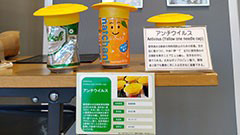
Antivirus (Yellow one needle cap): A tool to
prevent reuse of used injection needle.
People are able to utilize Antivirus by attaching it to an
empty can that is available easily in developing countries
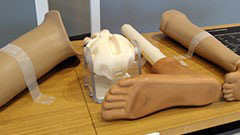
Jaipur Foot: A rubber-based prosthetic leg.
Inexpensive, it is accepted widely.
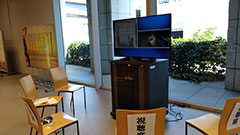
The materials were displaying on the monitor repeatedly. We laid chairs for visitors to sit down and watch them.
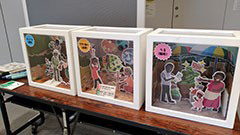
Those exhibits express troubles that people in developing countries meet in daily life and its solution. The exhibits caught the visitors' eye.
Actually, people who came to city office for another business visited and said us, "I could get a lot of knowledge about international cooperation", and "It is easy to see and understand." The materials were displaying on the monitor repeatedly, we felt from it, the movies added sounds and motions to our exhibition to get visitors' interest. Although visitors were able to understand actual international cooperation and problems in developing countries from pictures and panels, because of watching videos, they could grasp the on-site conditions of those projects more and more, we thought.
It is difficult to come and go among countries under the COVID19. Because we can only do limited activities, it is more important for us to look back experiences of international cooperation and to think what we can do in current condition for the future. We expect the exhibition will give visitors an opportunity to get awareness of what they can do individually
Chiyoda City Community Promotion Department
International Peace and Gender Equality Division
*The Material(s) mainly applied
Maternal and Child Health Handbook to the World- The Process of Introduction and Dissemination in Developing Countries
This material outlines the method of introducing and disseminating Maternal and Child Health Handbooks in developing countries through JICA's experiences in this field. JICA has been working on dissemination of Maternal and Child Health Handbooks in developing countries based on Japanese experience. This material outlines the introduction procedure of Maternal and Child Health Handbooks. It will be possible to be used in symposiums, seminars, training in Japan and third country training.
JICA's Cooperation on water and sanitation
"JICA's cooperation on water and sanitation" explains and publicizes JICA's work on water and sanitation issues at international conferences and domestic events. It is aimed at any group, in Japan or elsewhere, with an interest in these matters. This material explains JICA's approach to water and sanitation issues, using various projects as examples. We hope this material will be used in many different situations, and raise awareness of JICA's work as a major development partner in water and sanitation causes.
JICA's Cooperation in the Health Sector - Actions for Human Security in Health -
JICA is promoting international cooperation and collaboration to help protect and nurture the lives of people in developing countries and achieve human security by focusing on capacity development. " JICA's Cooperation in the Health Sector: Actions for Human Security in Health Sector" provides an insight into JICA's approach towards cooperation in the health sector through the introduction of projects to strengthen local health systems, improve mother and child health care, and control infectious diseases.




scroll